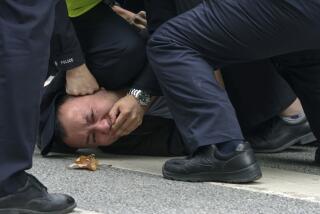Riding China’s tumultuous wave of change
- Share via
The Bitter Sea
Coming of Age in a China Before Mao
Charles N. Li
HarperCollins: 284 pp., $25.95
*
THE title of Charles Li’s intriguing memoir of his journey to adulthood, “The Bitter Sea,” is a literal translation of the Chinese term ku hai, which is usually rendered as “life and the human condition” -- a vast ocean of unpalatable brine. A recently retired professor of linguistics at UC Santa Barbara, Li was born in Nanjing in 1940 and witnessed many of the tumultuous changes China underwent in the mid-20th century.
Li’s early childhood was spent in opulent isolation at the family compound in Nanjing. His father served as a senior minister in the collaborationist regime of Wang Jing-wei, which the Japanese established to administer the area of China it occupied. Born after the atrocities of the Rape of Nanjing, Li nevertheless saw, from his bedroom window, Japanese soldiers shoot Chinese civilians. His father would leave for work in a guarded limousine.
After the Japanese surrender, officers of Chiang Kai-shek’s nationalist army looted the compound. Li’s father was arrested and sent to prison; his mother dismissed their retinue of servants and moved the family to a slum at the edge of Nanjing.
Oddly, poverty provided Li with his happiest memories. His mother was overwhelmed by work and worry; his siblings were too old and too focused on their own problems to pay attention to a 6-year-old. As the youngest son of a government official, Li had always been watched by a nanny, his only companion; as a slum kid, he had liberty, friends and adventures. Li and his pals may have been hungry and cold in hand-me-down jackets, but they reveled in their freedom, exploring their squalid, semirural neighborhood, playing games and getting into mischief: “None of my friends had any family supervision,” he recalls. “None of us went to school. We had no toys. But we played with gusto and ingenuity.”
This grubby idyll proved short-lived. Li was sent to live with an aunt in Shanghai. Although its freewheeling glory days were already past, Shanghai offered a more sophisticated life, superior schools and better food. As a boy, Li witnessed the collapse of Chiang’s corrupt rule and the arrival of Mao Tse-tung’s Communist troops into the city. Li moved again, this time to Hong Kong, in the waning days of the British Empire. Hong Kong proved a greater shock to Li than poverty or Communism had; he had to learn a new dialect and adjust to seeing Chinese treated as inferiors by the British. He also had to reestablish a relationship with his exiled parents: his quiet, distant mother and his tyrannical father, who embodied the worst qualities of a Chinese patriarch and a petty satrap. “My relationship with my father had been testy from my earliest memory,” he writes. “There in the tropical colony, he and I were destined to continue a wary pas de deux, each of us increasing the other’s irritations and disappointments. His were expressed in both words and actions; mine were covert and secret.”
Li knew the outlines of his father’s career: He had been admitted to the elite Peking University and also studied abroad. During the tumultuous 1930s, he sided with Wang Jing-wei’s faction in the Nationalist government, which led to his high position in the “Vichy” regime in Nanjing. But after his mother left his father, Li discovered that accounts of his father’s illustrious career had been heavily edited. The elder Li had abandoned his “village wife” and two daughters to pursue his education. He had rationalized his collaboration with the Japanese invaders. While his children from his second marriage, to Li’s mother, were suffering from hunger, tuberculosis and rheumatic fever in the slums of Nanjing, he had stashed away $25,000 in American Express traveler’s checks, which he planned to use to finance his political comeback.
Li felt that he and his father were finally “inching toward a normal and affectionate father-son relationship” when he began receiving tutorial sessions from him during high school in Hong Kong. After graduation, he returned to the Communist mainland, during Mao’s disastrous Great Leap Forward. But after a year of rote propaganda and bad food, Li found that he’d been deemed “politically unfit” to become a university student. His instructor, a hard-line cadre, told Li that his father, still considered a collaborator and a criminal, had been wrong to use his son to test the political waters in China in hopes of rehabilitating himself. Li was devastated by the realization that “Father was thinking about himself all that time when he had tutored me in politics. He wanted me to serve as his trial balloon.”
Despite his father’s selfishness and cruelty, Li eventually established a warm relationship with him. His stormy narrative ultimately becomes a journey to reconciliation, as Li makes peace with his father, with his heritage and with China itself.
--
Charles Solomon is the author of many books, including “Enchanted Drawings: The History of Animation” and “The Disney That Never Was.”


